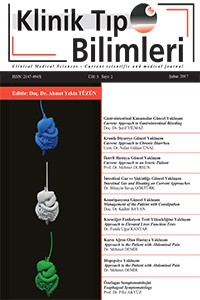Abstract
Abstract
Gastrointestinal bleeding is one of the most important indications of urgent hospitalization. Upper gastrointestinal bleeding is defined as bleeding derived from a sourceproximal to the ligament of Treitz. It is reported that it has an annual incidence rangingfrom approximately 80 to 170 per 100 000 of the population. It’s approximately 20 forlower gastrointestinal bleeding. Although many improvements have been achieved indiagnostic and therapeutic interventions, gastrointestinal bleeding still has a very highmortality risk especially in the elderly. Peptic ulcer disease is responsible for more thanhalf of the upper gastrointestinal bleeding cases. The other common causes are gastricerosions, esophageal varices, Mallory-Weiss tears, esophagitis, erosive duodenitis, andneoplasms. Lower gastrointestinal bleeding is another source of bleeding and most common causes are perianal diseases, diverticulosis, angiodysplasia, inflammatory bowel diseases and neoplasms. The leading causes of significant lower gastrointestinal bleedingare diverticulosis and angiodysplasia. These are more common in the elderly than in younger people. Hemorrhoids are the most common cause in patients younger than 50 years, but the bleeding is usually minor. Gasrointestinal endoscopic technics are the main procedures in managementof gastrointestinal bleeding patients.
References
- Kaynaklar 1.Thomas J. Savides and Dennis M. Jensen: Gastrointestinal Bleeding.In: Sleisenger and Fordtran’s Gastrointestinal and Liver Disease.Ninth Ed. Saunders Elsevier. 2010. Chapter 19, p:285-322 2.Barkun A, Bardou M, Marshall JK. Consensus recommeditions formanaging patients with upper gastrointestinal bleeding. Ann InternMed 2003;139:843-57 3.Lau YJ, Sung JJ, Lee KK, et al. Effect of intravenous omeprazole onrecurent bleeding after endoscopic treatment of bleeding peptic ul-cers. N Engl J Med 2000;343:310-16 4.Forrest JA, Finlayson ND, Shearman DJ. Endoscopy in gastrointes-tinal bleeding. Lancet 1974; 2:394-7 5.Yilmaz S, Bayan K, Tüzün Y, et al. A head to head comparison of oralvs intravenous omeprazole for patients with bleeding peptic ulcerswith a clean base, flat spots and adherent clots. World J Gastroen-terol. 2006 Dec 28;12(48):7837-43 6.Rockall TA, Logan RF, Devlin HB, et al. Risk assessment after acu-te upper gastrointestinal haemorrhage.Gut 1996; 38: 316-321 7.Graham DY, Smith JL. The course of patients after variceal hemorr-hage. Gastroenterology 1981; 80:800-9 8.McGuire HH Jr. Bleeding colonic diverticula. A reappraisal of na-tural history and management. Ann Surg 1994; 220:653-6
Abstract
Öz
Gastrointestinal kanama acil hastane yatışlarının en önemli nedenlerinden birisidir.Üst gastrointestinal kanama Treitz ligamenti proksimalinden kaynaklanan kanama olarak tanımlanır. Yıllık insidansın 100.000’lik populasyonda yaklaşık 80-170 olduğu bildirilmektedir. Aynı insidans alt gastrointestinal kanama için 20 civarındadır. Tanısal ve tedavi edici girişimlerde birçok gelişme olmasına rağmen gastrointestinal kanama özellikle yaşlılarda çok yüksek ölüm riski taşımaktadır. Peptik ülser kanaması üst gastrointestinal kanama olgularının yarısından fazlasından sorumludur. Diğer sık sebepler gastrik erozyonlar, özofageal varisler, Mallory-Weiss yırtıkları, özofajit, erozif duodenit veneoplazmlardır. Alt gastrointestinal kanama diğer bir kanama kaynağıdır ve en sık nedenleri perianal hastalıklar, divertikülozis, anjiyodisplazi, inflamatuar barsak hastalık-ları ve neoplazmlardır. Önde gelen aşikâr alt gastrointestinal kanama nedenleri divertikülozis ve anjiyodisplazidir. Hemoroidler 50 yaş altı kanamaların en sık sebebidir fakatkanama genellikle minördür. Gastrointestinal endoskopik teknikler gastrointestinal kanamalı hastaların tedavisinde ana yöntemlerdir.
Keywords
References
- Kaynaklar 1.Thomas J. Savides and Dennis M. Jensen: Gastrointestinal Bleeding.In: Sleisenger and Fordtran’s Gastrointestinal and Liver Disease.Ninth Ed. Saunders Elsevier. 2010. Chapter 19, p:285-322 2.Barkun A, Bardou M, Marshall JK. Consensus recommeditions formanaging patients with upper gastrointestinal bleeding. Ann InternMed 2003;139:843-57 3.Lau YJ, Sung JJ, Lee KK, et al. Effect of intravenous omeprazole onrecurent bleeding after endoscopic treatment of bleeding peptic ul-cers. N Engl J Med 2000;343:310-16 4.Forrest JA, Finlayson ND, Shearman DJ. Endoscopy in gastrointes-tinal bleeding. Lancet 1974; 2:394-7 5.Yilmaz S, Bayan K, Tüzün Y, et al. A head to head comparison of oralvs intravenous omeprazole for patients with bleeding peptic ulcerswith a clean base, flat spots and adherent clots. World J Gastroen-terol. 2006 Dec 28;12(48):7837-43 6.Rockall TA, Logan RF, Devlin HB, et al. Risk assessment after acu-te upper gastrointestinal haemorrhage.Gut 1996; 38: 316-321 7.Graham DY, Smith JL. The course of patients after variceal hemorr-hage. Gastroenterology 1981; 80:800-9 8.McGuire HH Jr. Bleeding colonic diverticula. A reappraisal of na-tural history and management. Ann Surg 1994; 220:653-6
Details
| Primary Language | Turkish |
|---|---|
| Journal Section | Makaleler 1 |
| Authors | |
| Publication Date | February 5, 2017 |
| Published in Issue | Year 2017 Volume: 5 Issue: 2 |


